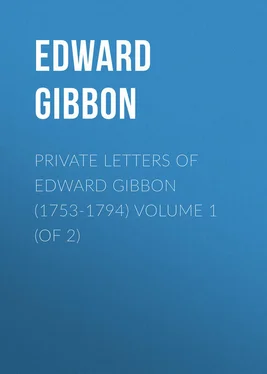The Earl of Abingdon married, on June 7, 1768, the daughter of Admiral Sir Peter Warren.
Serjeant Glynn, well known as the advocate of Wilkes, was afterwards elected as second member for Middlesex at a by-election. He married a daughter of Sir J. Oglander, of Nunwell, in the Isle of Wight, and had been an unsuccessful candidate for one of the Isle of Wight constituencies at the general election of 1768.
John Dunning, afterwards Lord Ashburton.
Sir Peter Leycester and Sir Frank Standish were found, November 29, 1768, not duly elected.
The return for Yarmouth, I.W., was amended by order of the House of Commons, dated January 19th, 1769, by erasing the names of Jervoise Clarke and William Strode, and substituting those of George Lane Parker and Thomas Lee Dummer.
On February 14, 1769, Sir George Osborne was found not duly elected, and Thomas Howe was declared duly elected. The return of Sir George Rodney was held to be valid. A note by Sir Denis le Marchant, appended to Lord Orford's Memoirs , states that the expenses of the contest and petition cost Lord Spencer £70,000.
John Wilkes was expelled from the House of Commons in January, 1764, and outlawed in the following August. He returned to England in February, 1768, and was at the bottom of the poll for the City (March 23). He headed the poll for Middlesex, March 28, 1768. His outlawry was reversed as technically illegal by the Court of King's Bench in the same year; but his two convictions for republishing No. 45 of the North Briton , and the Essay on Woman , were affirmed, and he was sentenced to two years' imprisonment. He was expelled the House February 3, 1769; re-elected February 16 and expelled February 27; re-elected March 16 and expelled March 17. At the election on April 13 he polled 1147 votes to the 296 of Colonel Luttrell; but the House resolved (April 15) that the election of Wilkes was void, and Luttrell duly elected. He was discharged from his imprisonment in 1770.
Lord Baltimore was charged with decoying to his house a young milliner named Sarah Woodcock, and with rape. On February 12, 1768, he was committed for trial at the spring assizes at Kingston, and acquitted in the following March.
"Il y a," writes Madame du Deffand to Walpole, speaking of La Princesse de Babylon (April 3, 1768), "quelques traits plaisants, mais c'est un mauvais ouvrage, et, contre son ordinaire, fort ennuyeux."
During Gibbon's stay at Lausanne in 1763, the duke, brother of the reigning duke, occupied a villa called La Chablière, a short distance from the town.
Sir Simeon Stuart, Bart., M.P. for the county of Southampton, died in November, 1779.
The bulk of the letters for the years 1768 and 1769 relate to the pecuniary affairs of the Gibbon family. Mr. Gibbon was the owner of estates at Maple Durham, in the parish of Beriton near Petersfield, at Lenborough in Buckinghamshire, and a house, garden, and lands at Putney. He had also inherited shares in the New River Company, and other investments. But he had for years lived beyond his income, and it was only to the wreck of this fortune that the historian succeeded in 1770.
On January 2, 1769, Wilkes was chosen alderman of the ward of Faringdon-Without against Bromwich, a paper-maker on Ludgate Hill.
The Baron de Wentzel was the most famous oculist of the day, and the discoverer of operations for cataract. He died in London in 1790.












